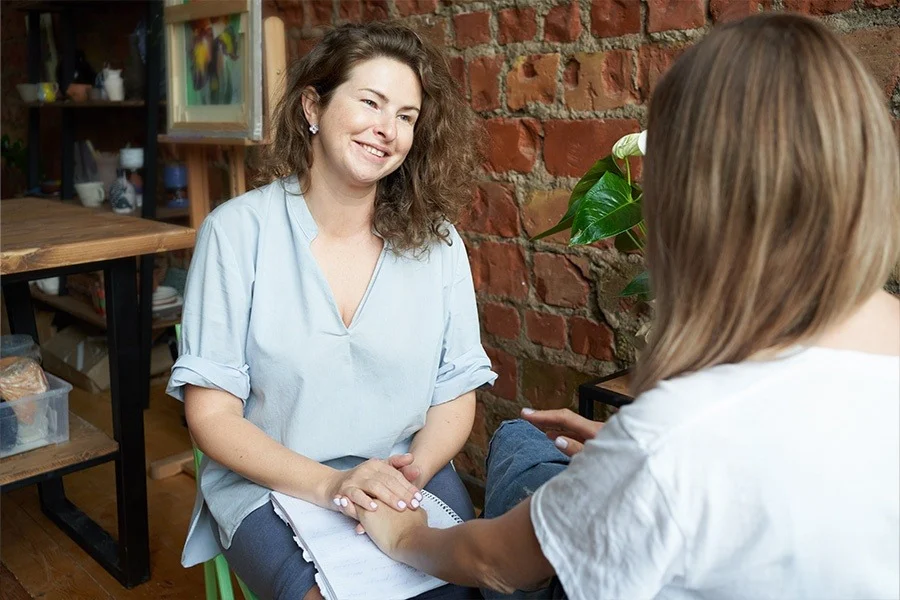Addiction is a complex disorder characterized by compulsive drug use despite harmful consequences. It is considered a brain disease because it involves changes to the structure and function of the brain. Addiction is characterized by addiction-related behaviors such as craving, seeking, and using drugs, loss of control over drug use, continued addiction despite negative consequences, and decreased involvement in activities that were once valued or important. Explore Westwind Recovery®’s addiction therapy services and learn more about each modality their program incorporates for sustainable recovery.

What Are Addiction Therapy Services?
Addiction treatment therapy programs in Los Angeles, California, are specialized services designed to provide recovery and relapse prevention in the form of individual, group, family, or 12-step therapy. The focus of these programs is on changing addiction-related behaviors through evidence-based treatments, including cognitive behavioral therapy, motivational interviewing, and acceptance and commitment therapy.
Types of Addiction Therapies
Addiction therapy can be used alone or in combination with medications to help you overcome addiction by targeting underlying conditions such as anxiety or depression. By incorporating these mental health services, programs such as individual and group therapy stand out as a part of our outpatient drug rehab in los angeles. Here are some of the therapies we offer:
Adventure Therapy
Adventure therapy, also known as experiential therapy, is a type of holistic treatment that incorporates activities such as rock climbing, rafting, or other outdoor adventures into the recovery process. Adventure therapies can help enhance traditional addiction therapy by increasing motivation to abstain from addiction triggers and providing an opportunity for psychological growth and healing in a supportive environment.
Adventure therapy can be beneficial for recovery because it helps facilitate self-reflection, promote self-discovery, increase communication skills, and improve problem-solving abilities. Additionally, adventure therapy provides a sense of accomplishment while helping patients fight off feelings of boredom and loneliness, which are common symptoms of addiction. By helping individuals learn to challenge themselves in new ways and find enjoyment in life without drug or alcohol addiction, addiction therapy can be highly beneficial for those who are seeking recovery.
Individual Therapy

Individual therapy sessions provide addiction patients with the opportunity to have one-on-one conversations with an addiction therapist about their addiction, triggers, and challenges related to recovery.
Trauma Therapy
Trauma therapy is designed to help patients process past traumatic experiences that may be contributing to addiction-related behaviors. Types of trauma-focused therapy include cognitive behavioral therapy (CBT), dialectical behavior therapy (DBT), and eye movement desensitization and reprocessing (EMDR).
EMDR Therapy
EMDR, or Eye Movement Desensitization and Reprocessing, is a psychotherapy technique designed to alleviate the distress associated with traumatic memories. It helps individuals in addiction recovery by processing the unresolved trauma and negative beliefs that often underlie drug use and addictive behaviors. By reprocessing these distressing memories, EMDR can reduce psychological triggers and cravings, leading to decreased relapse rates and supporting long-term sobriety.
Experiential Therapy
Experiential therapy helps individuals address emotional needs through participation in activities such as art, music, or meditation. This differs from traditional talk therapy and helps encourage self-exploration. It can also help patients adopt new hobbies to help sustain sobriety.
Group Therapy

Group therapy sessions give addiction therapy patients a chance to share their stories and collaborate on recovery strategies in an open, safe, and supportive environment. Additionally, this type of therapy encourages members to learn from each other’s experiences, support each other through challenges, and develop positive peer relationships.
Family Therapy
Family counseling is an important part of addiction treatment and helps family members learn how to respond, interact, support, and cope with addiction-related issues. In these sessions, families work together to identify triggers for addiction use and develop strategies to help the recovering individual stay on track.
Family counseling sessions provide clients with the opportunity to discuss addiction-related issues with their family members. During these sessions, addiction therapists can help families understand addiction, repair relationships, support recovery efforts, and develop healthier communication patterns.
Music Therapy
Music therapy is a type of program that uses music as a form of self-expression and healing for those struggling with addiction. This type of therapy provides an outlet for people to explore emotions related to addiction in a healthy way while also providing positive outlets for personal expression through writing lyrics and creating music.
Art Therapy
Art therapy allows individuals to express themselves in a creative, non-verbal way. Art therapy involves creating art pieces that express difficult emotions and experiences related to addiction without the use of words. The act of creating art can give individuals a sense of accomplishment and help them build self-esteem and resilience in recovery.
12-Step Program
12-step programs such as AA, NA, and CA are commonly used addiction therapy programs. The 12 steps provide a structured approach to recovery, with each step addressing a different aspect of addiction. Working through the 12 steps helps individuals gain an understanding of their addiction and develop new behaviors and skills for living a sober life.
Pain Management
Pain management techniques can be beneficial for addiction therapy. Learning how to manage pain in a healthy way can help individuals cope with the physical and psychological pain associated with addiction. This may include relaxation techniques, mindfulness practices, guided imagery, and biofeedback.
Health and Wellness
Health and wellness are integral components of addiction recovery. Addiction therapy services may include activities that promote physical and mental health, such as exercise, nutrition counseling, and stress management. These activities can help individuals develop healthier habits while also providing a way to channel energy into productive outlets.
Support Groups

Connecting with peers is an essential component of addiction recovery. These groups provide a safe and supportive community for individuals to share their stories and gain insight into the process of recovery. This can be especially beneficial when addiction has caused isolation from loved ones.
Cognitive Behavioral Therapy (CBT)
Cognitive behavioral therapy (CBT) helps patients examine their thought processes and behaviors that may be causing or perpetuating their addiction issues. With CBT techniques such as problem-solving, goal setting, and relaxation training, individuals can gain insight into how they think and behave in order to make changes that improve their addiction recovery.
Dialectical Behavioral Therapy (DBT)
Dialectical behavior therapy (DBT) is a form of cognitive behavioral therapy, but it takes the approach a step further by focusing on acceptance with patients to manage their emotions more effectively. Through this type of addiction therapy service, individuals learn how to regulate their emotions and better cope with stress while developing healthier behaviors.
Acceptance and Commitment Therapy (ACT)
Acceptance and commitment therapy (ACT) is another form of cognitive behavioral therapy, but rather than focusing on changing negative thoughts, it encourages addiction treatment patients to accept their thoughts without judgment while identifying values and goals in order to move forward with recovery. This type of addiction therapy service helps individuals improve their ability to focus on the present instead of worrying about the past or future.
Treatment Settings for Addiction Therapy
At Westwind Recovery® in Los Angeles, California, we understand that every journey to recovery is unique. That’s why our Los Angeles facilities offer a variety of treatment settings tailored to meet the individual needs of those struggling with addiction. Our addiction treatment environments are designed to provide a safe, supportive, and compassionate space where individuals can focus on healing from alcohol and drugs.
Our mission is to create a responsible and caring atmosphere that encourages personal growth and lasting recovery. With dedicated staff and a commitment to encouragement and support, we help individuals regain control of their lives and move forward with confidence. By choosing our treatment center in California, you’ll find the help and guidance you need to start your recovery journey in a positive, uplifting setting—one that truly understands the challenges of drug use and is committed to helping you overcome them.
Overcoming Challenges in Recovery
Recovery from addiction is a journey that involves addressing not just the physical effects of addiction, but also the emotional and mental health challenges that come with it. Our treatment programs in Los Angeles are designed to help individuals navigate these complex aspects of recovery, providing comprehensive support for substance use, mental health issues, and personal struggles.
With the guidance of our experienced professionals, clients develop the skills and strategies needed to maintain sobriety and achieve long-term recovery. From the moment you request help, our dedicated team is here to provide support, answer your questions, and respond to your concerns. Our website offers valuable information and resources for those seeking help, ensuring you have access to the guidance you need at every stage of your recovery journey. At every step, we are committed to helping you overcome the challenges of addiction and find a path to lasting wellness.
Maintenance and Aftercare
Achieving sobriety is a significant milestone, but maintaining it requires ongoing commitment and support. That’s why our Los Angeles treatment center offers a comprehensive range of aftercare programs designed to help individuals sustain their recovery. Our aftercare options include ongoing therapy, support groups, and personalized guidance to ensure you stay on track even after completing your initial treatment.
We recognize that recovery is a lifelong journey, and our mission is to provide the support and direction you need to achieve your goals. By calling our facility, you can take the first step toward transforming your life and building a future free from addiction. Our experienced team is dedicated to helping you find the support, encouragement, and resources you need to turn your life around and start a new chapter in your recovery. In our safe and welcoming environment, you’ll find the help you need to overcome addiction and live a fulfilling, healthy life.
Our Addiction Therapy Services Can Assist You at Westwind Recovery®®
At Westwind Recovery® in Los Angeles, California, we understand that substance abuse disorder requires detox and comprehensive treatment in order to treat the body and mind of every person who steps foot in one of our Los Angeles rehab facilities. We offer different types of resources at our Los Angeles rehab facility for our clients to treat their mental and substance use disorders. Alcohol and drug addiction require long-term recovery, and we can assist you with that.
Don’t allow your addiction to risk you forfeiting long-term recovery and needed treatment. Your life is important to us and we treat our clients with the utmost respect. You can detox from drugs and be free from relapse and fully recover. If you or a loved one is in need of our addiction therapy services, reach out to us.

Dr. Deena is the Chief Clinical Officer of Westwind Recovery®, an award-winning outpatient treatment center in Los Angeles where she oversees the clinical and administrative program and treatment methods. Dr. Deena is a doctor of psychology and licensed clinical social worker since 1993. LCSW #20628. Originally from the East Coast, Dr. Deena has worked running treatment centers, worked as a therapist in psychiatric hospitals as well as school settings and currently has a thriving private practice in the LA area. Dr. Deena has appeared regularly on the Dr. Phil Show as an expert since 2003. She has also been featured on many other TV shows, podcasts and has contributed to written publications as well as podcasts.




